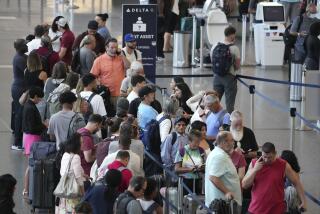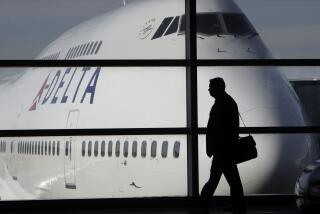In a Surprise Move, CEO of Delta to Retire
- Share via
Ronald W. Allen, who led Delta Air Lines back to prosperity after huge losses in the early 1990s, surprised the airline industry Monday by announcing plans to retire as Delta’s chairman and chief executive July 31, at age 55.
Delta, based in Atlanta, said its board has started looking for a replacement for Allen, who has held those posts since 1987. He also has been president of Delta, the nation’s third-largest carrier, since 1993.
Allen issued a statement saying Delta had made “great progress” toward his goal of leading the airline back to “sustained profitability.” But he did not explicitly say why he is leaving, and Delta would not elaborate.
Industry observers concluded that Allen, who has spent his entire career at Delta, simply wants to do something else now that Delta is much healthier and normal retirement age is still a decade away for him.
There was some Wall Street scuttlebutt that Allen might be paying the price for Delta’s failed merger talks with Continental Airlines last fall, but most analysts strongly rejected that scenario or any other involving a dispute with Delta’s board that would have led to Allen being forced out.
“You’d be hard-pressed to find great fault with his performance over the last few years,” said Jeffrey Long, airline analyst at J.P. Morgan Securities in New York. “He’s presided over one of the more dramatic restructurings in the airline industry.”
John Pincavage, analyst at the investment firm Dillon, Read & Co. in New York, said, “Perhaps it’s time to turn over a new page and do something different--I don’t know that it’s anything more than that.”
What also surprised the industry was Delta’s decision to consider replacement candidates from outside the airline. Delta, since its founding in the 1920s as a crop-dusting service, has consistently chosen its chief executive from its own ranks.
Industry trackers noted that a few other big airlines--notably Continental--have prospered in recent years after tapping chief executives from outside.
Also, because Allen’s retirement was not expected for at least a few years, “there really isn’t clear [management] succession at Delta,” Long said.
For now, Delta said, its executive vice president, Maurice Worth, will be acting chief operating officer, working with Harry Alger and Robert Coggin, Delta’s executive vice presidents for operations and marketing, respectively, to oversee day-to-day operations.
Allen was at Delta’s helm when the airline flew into disaster in the early 1990s. With the airline business reeling from economic recession and declining passenger traffic, Delta was particularly vulnerable because of its excessively high operating costs, aging fleet and its purchase of loss-plagued European routes from the old Pan American World Airways.
Delta lost a staggering $1.6 billion in the four years between 1991 and 1994, which prompted Allen three years ago to launch an aggressive cost-cutting strategy. It was called “7.5”--referring to the industry’s standard “cost-per-available-seat-mile” manner of measuring its expenses. Delta wanted to cut its costs from 9 cents to 7.5 cents.
The carrier slashed more than 15,000 jobs from its payroll, modernized its fleet to make it more fuel-efficient, abandoned unprofitable routes, struck cost-saving contracts with its labor unions and still looked at ways to trim.
Indeed, it was Delta that led the airline industry’s move in early 1995 to cap commissions paid to travel agents for writing tickets--an action that sent the travel-agent industry into an uproar.
The airline also threatened to move more than 900 reservation agent jobs out of its facility near Los Angeles International Airport because the rent was too high. The carrier stayed after reaching new lease terms with LAX.
It was all a wrenching change for Delta, an airline long known for its paternalistic corporate culture, warm treatment of employees, Southern hospitality toward travelers and exceptionally clean planes. As the changes were implemented, Delta’s service and on-time performance began to slip noticeably.
Delta never got all the way to 7.5 cents--the figure stood at 8 cents in this year’s first quarter--but analysts still praised Allen for achieving most of the goal and putting Delta back in the black, especially in light of rising jet fuel costs this year.
During the two years ended June 30 (the end of Delta’s fiscal year), the airline reported more than $550 million in profit. Its cost savings also enabled the airline to launch a new low-fare service, called Delta Express, that operates in Florida and elsewhere on the East Coast.
Investors have also applauded Allen’s actions. Delta’s stock has more than doubled in price since mid-1994, far outpacing the 67% gain of the Dow Jones transportation average. After Allen’s announcement Monday, Delta shares closed at $95, up 50 cents, in New York Stock Exchange trading.
More to Read
Inside the business of entertainment
The Wide Shot brings you news, analysis and insights on everything from streaming wars to production — and what it all means for the future.
You may occasionally receive promotional content from the Los Angeles Times.











